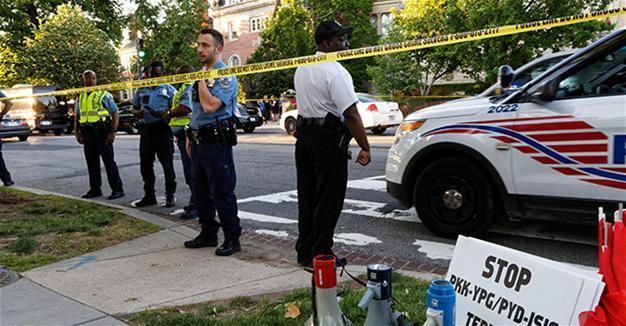US decries Washington brawl during Erdoğan’s visit
WASHINGTON - Reuters

AFP photo
The United States said on May 17 that it was voicing its “strongest possible” concern to Turkey over a street brawl that erupted between protesters and Turkish security personnel during President Recep Tayyip Erdoğan’s recent visit to Washington.Turkey blamed the violence outside its ambassador’s residence on demonstrators linked to the outlawed Kurdistan Workers’ Party (PKK), but Washington’s police chief called it a “brutal attack” on peaceful protesters.
Police said 11 people were injured, including a Washington police officer, and two people were detained for assault. At least one of those detained was a protester.
“We are communicating our concern to the Turkish government in the strongest possible terms,” State Department spokeswoman Heather Nauert said in a statement.
A video posted online showed men in dark suits chasing anti-government protesters and punching and kicking them as police intervened. Two men were bloodied from head wounds as bystanders assisted dazed protesters.
Washington Police Chief Peter Newsham told a news conference on May 17 that police had a good idea of most of the assailants’ identities and were investigating with the Secret Service and State Department.
One of the men detained, Jalal Kheirabadi, told Reuters he was being beaten by three or four people when a D.C. police officer accused him of assault. He spoke by phone on May 17 night after he was released pending a June court hearing.
Kheirabadi, 42, of Fairfax, Virginia, said he attended the protest to urge the United States to continue its support for Syrian Kurdish forces in Syria. He said he remembered being punched by three or four of Erdoğan’s guards and seeing a D.C. police officer fall, but he did not recall hitting the officer.
“He stood up and protected me from them, and then he handcuffed me. He was a real gentleman, I appreciated that,” said Kheirabadi, adding that he immediately apologized to the officer.
He also he has lived in the United States for 13 years with his family, including a young son, and had never been in legal trouble in the United States before his detainment.
“I didn’t go there to fight,” he said. “It just happened.”
A charging document for the other man detained, Ayten Necmi, 49, of Woodside, New York, said peaceful protesters were taunted by a second group of demonstrators who shouted obscenities and taunts at them.
The document said four or five Middle Eastern men in dark suits from the second group assaulted the peaceful protesters. It said about eight people told officers they were attacked, thrown on the ground and stomped.
The Turkish Embassy said in a statement the protesters were affiliated with the PKK.
The embassy said Erdoğan was in the ambassador’s residence after meeting President Donald Trump, and Turkish-Americans who were there to greet him responded to provocations from PKK-linked protesters.
“The violence and injuries were the result of this unpermitted, provocative demonstration,” the statement said.
Meanwhile, House of Representatives Foreign Affairs Committee Chairman Ed Royce, a California Republican, called on Attorney General Jeff Sessions and Secretary of State Rex Tillerson “to hold individuals accountable” for the attack.
Washington Mayor Muriel Bowser and five Republican senators, including John McCain of Arizona and Marco Rubio of Florida, also condemned the assault.
Mehmet Tankan, 31, said he was one of a dozen protesters outside the ambassador’s residence chanting anti-Erdoğan slogans when the brawl broke out.
Tankan said by telephone seven security personnel, some carrying firearms, rushed up and began punching him, bruising him all over his body.
Tankan noted that the violence was worse than when Erdoğan visited Washington in March 2016, when scuffles erupted between his security detail and demonstrators.
“The next time they could kill us easily. I’m scared now too, because I don’t know how it will affect my life here in the United States,” said Tankan, who lives in Arlington, Virginia.
















